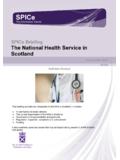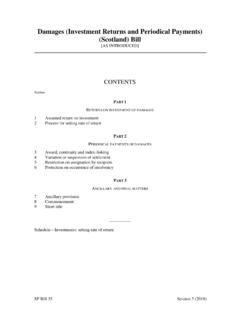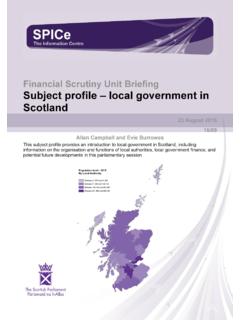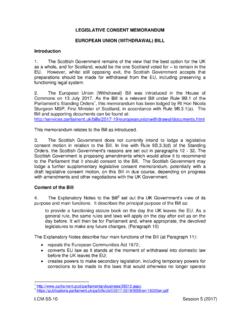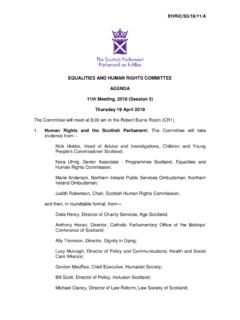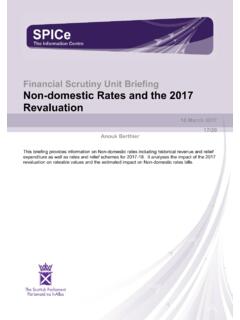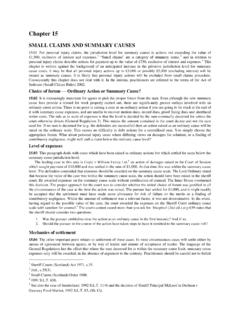Transcription of CIVIL LITIGATION (EXPENSES AND GROUP …
1 This document relates to the CIVIL LITIGATION ( expenses and GROUP Proceedings) ( scotland ) Bill (SP Bill 14) as introduced in the Scottish Parliament on 1 June 2017 SP Bill 14 PM 1 Session 5 (2017) CIVIL LITIGATION ( expenses AND GROUP PROCEEDINGS) ( scotland ) BILL POLICY MEMORANDUM INTRODUCTION 1. As required under Rule of the Parliament s Standing Orders, this Policy Memorandum is published to accompany the CIVIL LITIGATION ( expenses and GROUP Proceedings) ( scotland ) Bill introduced in the Scottish Parliament on 1 June 2017. 2. The following other accompanying documents are published separately: Explanatory Notes (SP Bill 14 EN); a Financial Memorandum (SP Bill 14 FM); statements on legislative competence by the Presiding Officer and the Scottish Government (SP 14 LC).
2 3. This Policy Memorandum has been prepared by the Scottish Government to set out the Government s policy behind the Bill. It does not form part of the Bill and has not been endorsed by the Parliament. POLICY OBJECTIVES OF THE BILL 4. The principal policy objective of this Bill is to increase access to justice by creating a more accessible, affordable and equitable CIVIL justice system. The Scottish Government aims to make the costs of court action more predictable, increase the funding options for pursuers of CIVIL actions and introduce a greater level of equality to the funding relationship between pursuers and defenders in personal injury actions.
3 5. The policy objectives of the Bill will contribute to the realisation of the Scottish Government s Purpose by contributing to the following national outcomes: National Outcome 1 on living in a scotland that is the most attractive place for doing business in Europe. National Outcome 11 on resilient communities by increasing public confidence in justice institutions and processes. National Outcome 16 on high quality, continually improving public services that are efficient and responsive to local people s needs. This document relates to the CIVIL LITIGATION ( expenses and GROUP Proceedings) ( scotland ) Bill (SP Bill 14) as introduced in the Scottish Parliament on 1 June 2017 2 BACKGROUND Scottish CIVIL Courts Review 6.
4 The Rt Hon Lord Gill s Report of the Scottish CIVIL Courts Review1 ( the SCCR ), published in September 2009, set out the most comprehensive programme of reform of the CIVIL courts in generations. The remit of the SCCR was to review the provision of CIVIL justice by the courts in scotland , including their structure, jurisdiction, procedures and working methods, having particular regard to: the cost of LITIGATION to parties and to the public purse; the role of mediation and other methods of dispute resolution in relation to court process; the development of modern methods of communication and case management; and the issue of specialisation of courts or procedures, including the relationship between the CIVIL and criminal courts.
5 7. The Scottish Government accepted the vision provided by Lord Gill and broadly accepted the detail of his recommendations. A range of work was taken forward to implement the recommendations. First of all, the Scottish CIVIL Justice Council was established with the remit of preparing draft rules of procedure for the CIVIL courts and advising the Lord President of the Court of Session on the development of the CIVIL justice system in scotland . Since then, the Courts Reform ( scotland ) Act 2014 has been enacted which has, amongst other things, enhanced the role of the sheriff courts and introduced a new Sheriff Appeal Court.
6 8. During the course of Lord Gill s deliberations, Lord Justice Jackson was appointed to undertake a fundamental review of the rules and principles governing the costs of CIVIL LITIGATION in England and Wales. Lord Gill took the view that recommendations from this review in England and Wales could have considerable implications for the conduct of LITIGATION in scotland . Accordingly, it was decided that the SCCR would not address the issue of LITIGATION expenses in scotland in detail and Lord Gill recommended that a separate review should be undertaken. Review of expenses and Funding of CIVIL LITIGATION 9.
7 On 4 March 2011, the then Minister for Community Safety, Fergus Ewing MSP, asked Sheriff Principal James A. Taylor to chair a Review of the expenses and Funding of CIVIL LITIGATION in scotland . The remit of the review was to review the costs and funding of CIVIL LITIGATION in the Court of Session and sheriff court in the context of the recommendations of the Scottish CIVIL Courts Review, and the response of the Scottish Government to that review. In undertaking the review, Sheriff Principal Taylor was to consult widely, gather 1 This document relates to the CIVIL LITIGATION ( expenses and GROUP Proceedings) ( scotland ) Bill (SP Bill 14) as introduced in the Scottish Parliament on 1 June 2017 3 evidence, compare the expenses regime in scotland with those of other jurisdictions and have regard to research and previous enquiries into costs and funding, including the CIVIL LITIGATION Costs Review of Lord Justice Jackson In so doing he was.
8 To consider issues in relation to the affordability of LITIGATION ; the recoverability and assessment of expenses ; and different models of funding LITIGATION (including contingency, speculative and conditional fees, before the event ( BTE ) and after the event ( ATE ) insurance, referral fees and claims management); to consider the extent to which alternatives to public funding may secure appropriate access to justice, and pay particular attention to the potential impact of any recommendations on publicly funded legal assistance; to have regard to the principles of CIVIL justice outlined in Chapter 1, paragraph 5 of the SCCR; to consider other factors and reasons why parties may not litigate in scotland ; and to report with recommendations to the Scottish Ministers, together with supporting evidence within 18 months of the work commencing.
9 10. The resulting report by Sheriff Principal Taylor is therefore interlinked with the SCCR and can be viewed as a continuation of that work; indeed the review was carried out on the assumption that Lord Gill s recommendations, which form the basis of the 2014 Act, would be in place. These structural changes create the framework to enable the recommendations from Sheriff Principal Taylor s review to be implemented. 11. Sheriff Principal Taylor presented his Review of expenses and Funding of CIVIL LITIGATION in scotland report2 to the then Cabinet Secretary for Justice, Kenny MacAskill MSP, in September 2013.
10 The report contained 85 recommendations aimed at delivering greater predictability and certainty in relation to the cost of LITIGATION , thereby increasing access to justice. Approximately half the recommendations do not require primary legislation and will be mostly implemented by rules of court drafted by the Scottish CIVIL Justice Council. The recommendations regarding sanction for counsel were provided for in the 2014 Act (at section 108)3. The other recommendations require further primary legislation and most will be implemented through this Bill. The main exceptions are regulation of the claims management industry and referral fees which will be considered in the recently-announced review of legal services4.


